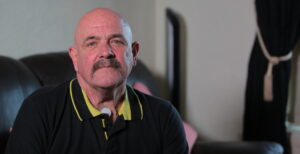Former smoker Tony Osborne from South Bank in Middlesbrough was diagnosed with laryngeal (throat) cancer when he was 52. Tony had to undergo major surgery to remove much of the inside of his neck, including his voice box. Tony breathes through an opening in his neck, known as a stoma, and talks using an artificial voice box.
Tony, who quit smoking for good on the day of his surgery, said: “I enjoyed smoking, but you don’t think about what it is doing to you. I should have taken notice when my father and two brothers died from lung cancer.
“I watched them die, that should have been enough for me to quit. I’d urge other smokers to stop now. Don’t let smoking ruin your life.”
“I was diagnosed with throat cancer on my 52nd birthday. I was stunned – I’d always thought of myself as fit and strong. I knew about lung cancer but I had no idea what was happening to my throat. I immediately knew it was the cigarettes. I knew what had caused it, so I thought why did I do it?
“The doctor told me if I wanted to live I had to have the operation straight away, which was a huge shock as I really didn’t want to have surgery before my son’s wedding in the August.”
Tony underwent a laryngectomy, which involves removal of the larynx (voice box), separation of the airway from the mouth, nose and oesophagus, and a full neck dissection. As a result, he could no longer speak unaided and had to adapt to a new way of breathing. He stopped smoking the day he underwent surgery.
He said: “I was in hospital for nearly three weeks but was determined to get better. When you first come round from the operation you have pipes coming out of you and are laid up in the bed. I couldn’t drink any water for the first week in case it leaked into my lungs – you can’t imagine how tough that is.
“It was difficult to get used to a new way of breathing through the stoma – the hole in my neck – rather than through my mouth or nose. It affects you in so many different ways. My nose doesn’t do anything anymore, I don’t breathe through it and I have no sense of smell. I had to learn how to talk again as I have to press down on the valve on my neck, and in order to talk I have to stop breathing.
“Eating takes me a lot longer than the average person because I’ve had so many nerves removed that I can’t move my tongue in the same way I used to. It’s a much harder process and my mouth is really sensitive now.
“Before I had this I’d run up the stairs but I can no longer do normal things like this, or walking distances. I have to be supervised when I take shower or bath as if I get water in my stoma – opening in my neck – it will go straight into my lungs and I’ll drown. I can no longer swim either which I really enjoyed.”
Tony, who provides support and advice to others going through similar procedures to his own, is now cancer-free but he will live with the lasting impacts for the rest of his life, knowing that it might have been avoided if he’d not smoked.
Tony Osbourne’s surgeon when he was diagnosed with cancer was Mr Shane Lester, ENT Head and Neck Surgeon, South Tees Hospitals NHS Foundation Trust, based at The James Cook University Hospital in Middlesbrough.
Mr Lester said: “If you’re a smoker your risk of having laryngeal cancer is much higher than if you had never smoked at all. “With head and neck cancer this can be very visible and surgery can change how your face moves, how you might eat or how you might speak. Even patients who get through everything and are out of surveillance still have to live with those side effects of it.
“We have a huge support team – dieticians, speech and swallowing therapists, specialist nurses all to help support patients get through this. And we offer support for patients to stop smoking when they are in hospital.
“If you are a smoker the best thing you can do is stop and to get whatever support you need, whether that’s from your stop smoking service or GP, with support from your family, or to just do it yourself. If you haven’t got cancer then stopping smoking can help prevent you getting cancer. For cancer patients, the chances of successful treatment are much better with stopping smoking.
“Sometimes people blame themselves, but lots of people who smoke started when they were kids, when the risks of smoking weren’t known and they got addicted. It’s far more healthy to look forward, to get help to stop smoking, and look forward to the health benefits of that.”
Watch Tony’s film below

